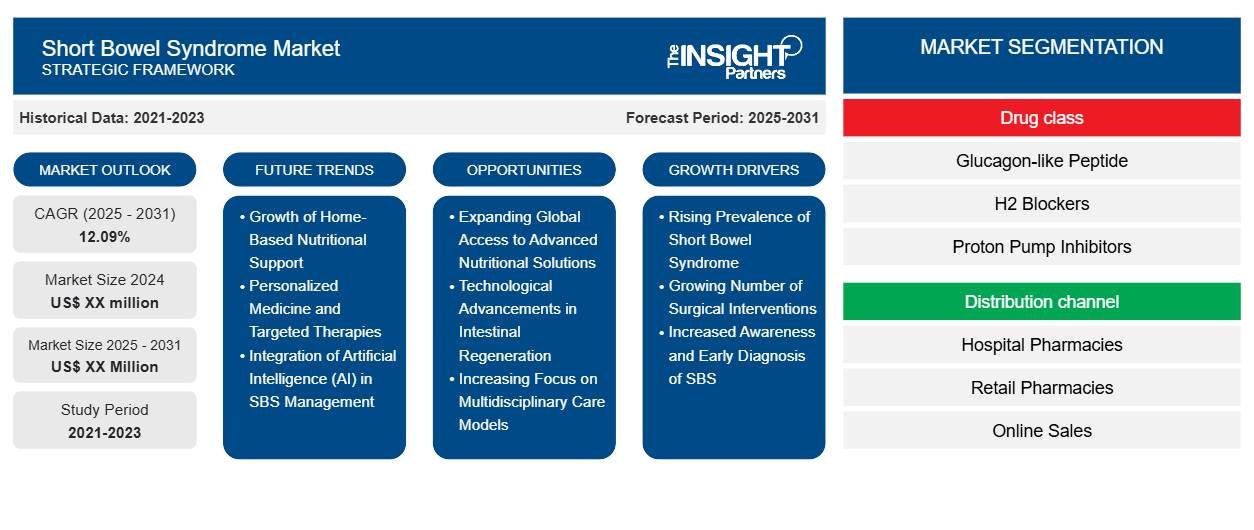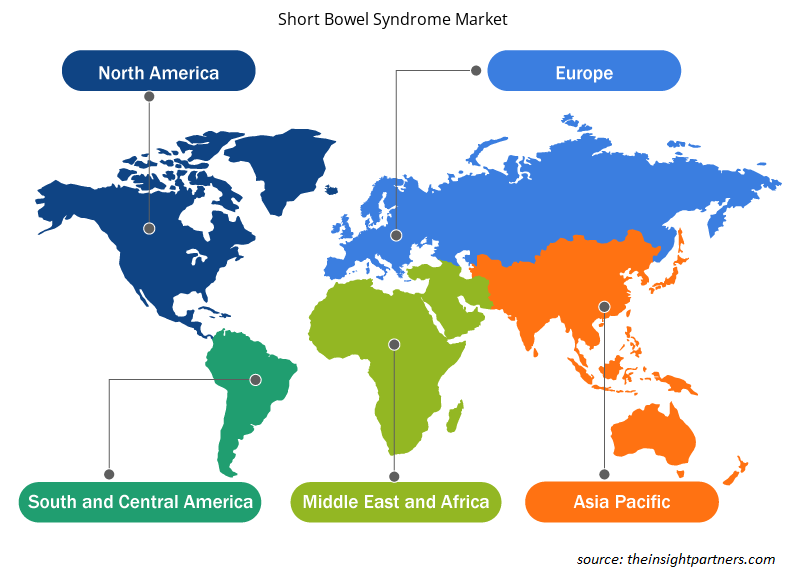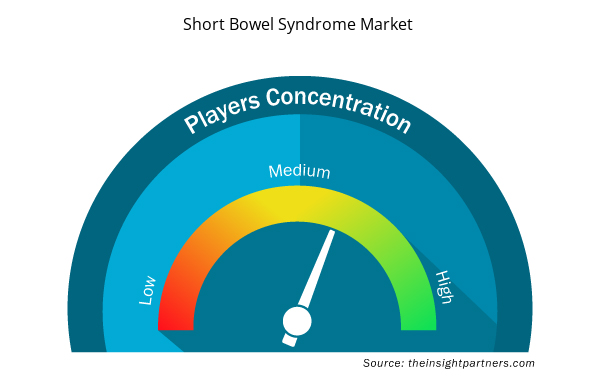The Short Bowel Syndrome Market is expected to register a CAGR of 12.09% from 2025 to 2031, with a market size expanding from US$ XX million in 2024 to US$ XX Million by 2031.
The report is segmented by Drug class (Glucagon-like Peptide, H2 Blockers, Proton Pump Inhibitors, Others); and Distribution channel (Hospital Pharmacies, Retail Pharmacies, Online Sales). The global analysis is broken down at the regional level and for major countries. The market evaluation is presented in US$ for the above segmental analysis.
Purpose of the Report
The report Short Bowel Syndrome Market by The Insight Partners aims to describe the present landscape and future growth, top driving factors, challenges, and opportunities. This will provide insights to various business stakeholders, such as:
- Technology Providers/Manufacturers: To understand the evolving market dynamics and know the potential growth opportunities, enabling them to make informed strategic decisions.
- Investors: To conduct a comprehensive trend analysis regarding the market growth rate, market financial projections, and opportunities that exist across the value chain.
- Regulatory bodies: To regulate policies and police activities in the market with the aim of minimizing abuse, preserving investor trust and confidence, and upholding the integrity and stability of the market.
Short Bowel Syndrome Market Segmentation
Drug class
- Glucagon-like Peptide
- H2 Blockers
- Proton Pump Inhibitors
Distribution channel
- Hospital Pharmacies
- Retail Pharmacies
- Online Sales
Customize This Report To Suit Your Requirement
You will get customization on any report - free of charge - including parts of this report, or country-level analysis, Excel Data pack, as well as avail great offers and discounts for start-ups & universities
Short Bowel Syndrome Market: Strategic Insights

- Get Top Key Market Trends of this report.This FREE sample will include data analysis, ranging from market trends to estimates and forecasts.
Short Bowel Syndrome Market Growth Drivers
- Rising Prevalence of Short Bowel Syndrome: The increasing prevalence of short bowel syndrome (SBS) is one of the primary growth drivers in this market. Short Bowel Syndrome cases are growing which drives this market development. The removal of a substantial part of the small intestine through surgery creates Short Bowel Syndrome which develops from Crohn's disease, ischemic bowel disease, or trauma. Advancements in surgery and more cases of underlying diseases have made SBS conditions appear more often. The number of SBS patients keeps increasing especially in North America and Europe because these regions have higher rates of intestinal disease surgeries. The need for SBS treatment methods like PN and enteral feeding grows because more patients survive intestinal surgeries but keep SBS. The number of SBS patients is increasing because medical teams now save more preterm infants who need intestinal surgery. Market expansion happens because people need more products to treat SBS symptoms such as drugs that improve gut function and devices for nutrient delivery. SBS therapy markets will grow worldwide in line with market projections that place this segment as a major contributor to total gastrointestinal therapeutic sales. The SBS market will grow and attract more patients for treatment because SBS cases keep increasing alongside healthcare efforts to help patients.
- Growing Number of Surgical Interventions: The rise in SBS cases is connected to better surgical techniques which save more of the digestive system. Surgical procedures used to treat Crohn's disease and other health problems like bowel resections and cancer can remove part of the small intestine which leads to SBS. The development of better medical tools and surgery methods lets doctors help more patients survive complex operations which then leads to more people developing SBS. SBS management solutions become more necessary due to rising numbers of patients who need surgery on their small intestine. People now survive surgical procedures for bowel obstruction and cancer better but their digestive system suffers which creates demand for treatment options that help them maintain proper nutrition and health. The market for SBS treatments that control nutrient absorption and gastrointestinal function grows because more patients develop this condition. Market projections show that growing surgery numbers will lead to more SBS patients in the future which will boost sales of SBS medical treatments. Companies that make enteral nutrition products and medical devices plus pharmaceuticals will see more business as the number of patients needing treatment grows.
- Increased Awareness and Early Diagnosis of SBS: The market for Short Bowel Syndrome treatments grows because healthcare providers now detect SBS sooner and patients know more about the disease. Healthcare teams have better recognized Short Bowel Syndrome through training which leads to earlier diagnosis. Detecting SBS early makes it possible to start effective treatment sooner which helps patients and lowers their chances of developing serious health problems. Advancements in medical technology and patient understanding now help doctors better detect and treat Short Bowel Syndrome compared to past years. Patients now recognize SBS better so they start getting medical help more often which creates more demand for treatments that help SBS patients live better. Improved medical diagnostics like CT scans MRI scans and specific blood tests will help doctors find SBS earlier which supports market growth. When patients learn more about SBS and treatment choices they will need more healthcare providers who focus on this condition. These elements including patient advocacy group efforts and healthcare organization outreach support market expansion. The SBS market will keep expanding as people gain more knowledge about this condition which drives demand for effective treatments.
Short Bowel Syndrome Market Future Trends
- Growth of Home-Based Nutritional Support: One of the most significant trends in the Short Bowel Syndrome (SBS) market is the growing shift toward home-based nutritional support. More SBS patients now receive nutritional treatment in their own homes. Before recent changes SBS patients received their parenteral nutrition treatment in hospital settings. Patients now receive their nutrition care at home which lets them take charge of their diet. Medical technology has advanced to create pumps that patients can use at home plus better feeding tubes and nutritional treatments. Patients with chronic SBS need long-term nutrition support which this trend helps them access. Healthcare providers who move care to home settings need specialized nutrition products, medical tools, and prescription drugs designed for home use. Market predictions show healthcare systems and patients will benefit from this trend because patients want more control over their treatment and shorter hospital stays while saving money. The SBS market will expand mainly in countries with established home care programs that are shifting healthcare delivery from hospitals to personal homes. Companies developing SBS therapeutic solutions will find business opportunities from consumer demand for nutrition delivery systems and home treatment products.
- Personalized Medicine and Targeted Therapies: The Short Bowel Syndrome market will transform because doctors now use more precise medicine and treatment methods to help patients. Medical experts and scientists now use patient-specific genetic information and disease conditions to design better treatments for Short Bowel Syndrome. Medical research produces focused treatments like biologics that treat SBS's root causes. Through personalization healthcare providers can design better treatment plans that help patients recover faster with fewer side effects. Doctors are now using GLP-2 analogs to help patients with SBS restore their digestive system. Targeted medical treatments based on genetic research will become standard methods of treating SBS as medical technology advances. Personalized treatment plans will become standard care for SBS patients because patients need them. Predictions show personalized medicine will develop the SBS market further to offer better tailored treatments to patients.
- Integration of Artificial Intelligence (AI) in SBS Management: The integration of artificial intelligence (AI) and machine learning into the management of Short Bowel Syndrome is an emerging trend that could significantly transform the market. Companies use artificial intelligence systems to manage Short Bowel Syndrome treatments as a new market development. AI systems help doctors make better diagnoses of SBS patients while tracking their conditions and choosing the right treatments. AI systems review comprehensive patient data including genetic markers medical history and treatment reactions to guide healthcare providers in better treatment choices. AI systems can help doctors find patients who might get SBS problems and track the results of different medical treatments as they happen. AI systems can now create individualized care plans to achieve better results for SBS patients. The market will grow because healthcare providers use artificial intelligence to improve patient care and make their treatment processes more efficient. Market analysts predict AI integration will help doctors deliver better healthcare services to SBS patients while making their work more effective. Companies leading this market growth will develop artificial intelligence solutions for both SBS diagnosis and treatment enhancement.
Short Bowel Syndrome Market Opportunities
- Expanding Global Access to Advanced Nutritional Solutions: An important growth opportunity in the Short Bowel Syndrome (SBS) market is the expansion of access to advanced nutritional solutions, particularly in emerging markets. The Short Bowel Syndrome market will grow through opening more markets to advanced nutritional treatments worldwide. The world sees more SBS patients emerge because of growing surgery numbers for Crohn's disease, cancer, and gastrointestinal injuries so better nutrition systems become essential. Nutritional therapy helps SBS patients get enough nutrients by giving them the calories and vitamins they need since their intestines cannot absorb them normally. Healthcare systems in developed markets use PN and enteral feeding tubes regularly to supply nutrition to SBS patients. Low-income and middle-income countries face difficulties getting these therapies because they cost too much and have poor healthcare systems. Companies should develop affordable solutions that work well in remote areas where medical care is limited. Healthcare providers and global health organizations are working to expand patient access while governments support this effort which creates more demand for affordable nutritional treatments. Market growth depends on creating portable feeders plus low-cost enteral nutrition products and home-friendly delivery systems. The rise of home medical care in areas with more healthcare education will boost market expansion. Medical companies and device makers who supply low-cost nutritious products to developing markets help grow the SBS market. Companies that focus their business on emerging markets with growing SBS rates can succeed in multiple markets while helping more patients worldwide.
- Technological Advancements in Intestinal Regeneration: The SBS market can expand through research and development of new intestinal restoration methods. Short Bowel Syndrome makes patients unable to absorb enough nutrients because their small intestine was severely damaged. Research in regenerative medicine shows that we can now develop better ways to heal or rebuild broken intestinal tissue. Scientists have advanced stem cell research as well as gene editing and tissue engineering techniques during the past ten years. Scientists discovered that stem cells can rebuild small intestinal tissue which offers new treatment possibilities for SBS patients. Technologies that help new intestinal cells grow better and make existing segments work better will reshape how doctors treat SBS patients. The development of GLP-2 analogs and other biologic therapies will drive medical progress forward in this field as companies lead the charge. The growing number of regenerative treatments for SBS expands treatment options which drives market prospects. New medical discoveries will help patients avoid long-term parenteral nutrition support and expensive treatments while making life better for them. The medical community and patient population will want more of these treatments because they are improving as research continues. The market expects regenerative treatments to grow more popular which will create new business potential in SBS treatment.
- Increasing Focus on Multidisciplinary Care Models: The market gains strength from expanding use of multidisciplinary teams to treat Short Bowel Syndrome patients. SBS patients need complete healthcare plans because they deal with nutrition problems plus fluid problems plus PN side effects. When healthcare experts from gastroenterology, nutrition, surgery, nursing and psychology work together they create personalized and integrated care for SBS patients. When multiple healthcare providers work together they help patients recover better and stay healthier while feeling better about their lives. More healthcare facilities now use a combined team approach to treat SBS patients because research proves it works better. The combined efforts of multiple healthcare disciplines help SBS patients avoid future treatment complications and follow their care plans better which saves money in the long run. More organizations will partner with healthcare providers to create personalized medical solutions which will bring new business possibilities to pharmaceutical companies medical device makers and nutrition product designers. The healthcare system now values integrated care more and will need better SBS management strategies because of this. Our industry will require better treatments for SBS patients that combine advanced nutrition support with therapy methods that aim to restore gut health and repair the body. Companies that deliver complete treatment plans to match these patient care models will succeed in the developing SBS market sector. The market growth for SBS treatments will increase as healthcare teams from different specialties work together to help patients.
Short Bowel Syndrome Market Regional Insights
The regional trends and factors influencing the Short Bowel Syndrome Market throughout the forecast period have been thoroughly explained by the analysts at Insight Partners. This section also discusses Short Bowel Syndrome Market segments and geography across North America, Europe, Asia Pacific, Middle East and Africa, and South and Central America.

- Get the Regional Specific Data for Short Bowel Syndrome Market
Short Bowel Syndrome Market Report Scope
| Report Attribute | Details |
|---|---|
| Market size in 2024 | US$ XX million |
| Market Size by 2031 | US$ XX Million |
| Global CAGR (2025 - 2031) | 12.09% |
| Historical Data | 2021-2023 |
| Forecast period | 2025-2031 |
| Segments Covered |
By Drug class
|
| Regions and Countries Covered | North America
|
| Market leaders and key company profiles |
Short Bowel Syndrome Market Players Density: Understanding Its Impact on Business Dynamics
The Short Bowel Syndrome Market market is growing rapidly, driven by increasing end-user demand due to factors such as evolving consumer preferences, technological advancements, and greater awareness of the product's benefits. As demand rises, businesses are expanding their offerings, innovating to meet consumer needs, and capitalizing on emerging trends, which further fuels market growth.
Market players density refers to the distribution of firms or companies operating within a particular market or industry. It indicates how many competitors (market players) are present in a given market space relative to its size or total market value.
Major Companies operating in the Short Bowel Syndrome Market are:
- Takeda Pharmaceutical Company Limited
- Zealand Pharma A/S
- VectivBio AG,
- 9 Meters Biopharma, Inc,
- Hanmi Pharm.Co.,Ltd,
- GlaxoSmithKline, Plc,
Disclaimer: The companies listed above are not ranked in any particular order.

- Get the Short Bowel Syndrome Market top key players overview
Key Selling Points
- Comprehensive Coverage: The report comprehensively covers the analysis of products, services, types, and end users of the Short Bowel Syndrome Market, providing a holistic landscape.
- Expert Analysis: The report is compiled based on the in-depth understanding of industry experts and analysts.
- Up-to-date Information: The report assures business relevance due to its coverage of recent information and data trends.
- Customization Options: This report can be customized to cater to specific client requirements and suit the business strategies aptly.
The research report on the Short Bowel Syndrome Market can, therefore, help spearhead the trail of decoding and understanding the industry scenario and growth prospects. Although there can be a few valid concerns, the overall benefits of this report tend to outweigh the disadvantages.
- Historical Analysis (2 Years), Base Year, Forecast (7 Years) with CAGR
- PEST and SWOT Analysis
- Market Size Value / Volume - Global, Regional, Country
- Industry and Competitive Landscape
- Excel Dataset



Report Coverage
Revenue forecast, Company Analysis, Industry landscape, Growth factors, and Trends

Segment Covered
This text is related
to segments covered.

Regional Scope
North America, Europe, Asia Pacific, Middle East & Africa, South & Central America

Country Scope
This text is related
to country scope.
Frequently Asked Questions
The Short Bowel Syndrome Market is estimated to witness a CAGR of 12.09% from 2025 to 2031.
The major factors driving the Short Bowel Syndrome Market are Rising Prevalence of Short Bowel Syndrome, Growing Number of Surgical Interventions, and Increased Awareness and Early Diagnosis of SBS.
Future trends in the Short Bowel Syndrome Market are the Growth of Home-Based Nutritional Support, Personalized Medicine and Targeted Therapies, and Integration of Artificial Intelligence (AI) in SBS Management.
Some of the players operating in the market are Takeda Pharmaceutical Company Limited, Zealand Pharma A/S, VectivBio AG, 9 Meters Biopharma, Inc, Hanmi Pharm.Co.,Ltd, GlaxoSmithKline, Plc, Cadila, Pharmaceuticals, Sun Pharmaceutical Industries Ltd, Troikaa, AJANTA PHARMA.
The report can be delivered in PDF/PPT format; we can also share an excel datasheet based on the request.
Some customization options available based on the request are an additional 3–5 company profiles and a country-specific analysis of 3–5 countries of your choice. Customizations are to be requested/discussed before making final order confirmation# as our team would review the same and check the feasibility.
Trends and growth analysis reports related to Life Sciences : READ MORE..
1.Takeda Pharmaceutical Company Limited
2.Zealand Pharma A/S
3.VectivBio AG
4.9 Meters Biopharma, Inc
5.Hanmi Pharm.Co.,Ltd
6.GlaxoSmithKline, Plc
7.Cadila Pharmaceuticals
8.Sun Pharmaceutical Industries Ltd
9.Troikaa
10.AJANTA PHARMA

 Get Free Sample For
Get Free Sample For